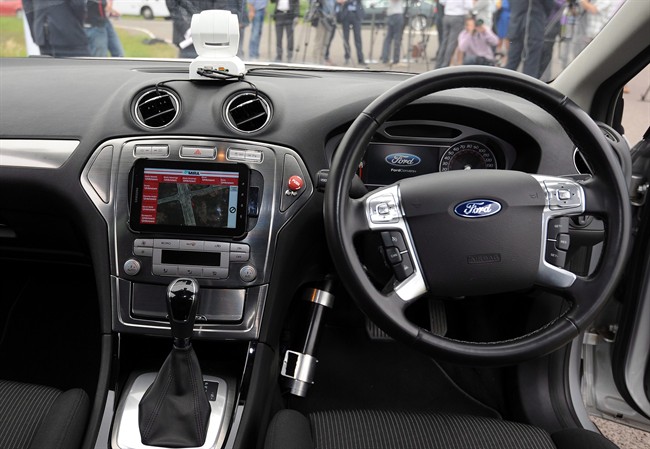On Oct. 12, a grey Lincoln MKZ took Ottawa’s Mayor Jim Watson for a short ride through Kanata in what was billed as the first on-street test of an autonomous vehicle in Canada.

The BlackBerry QNX equipped car ride was, depending upon your perspective, a short ride for Mayor Jim Watson, or the start of a long journey for BlackBerry and Canada’s technology sector, autonomous vehicles and artificial intelligence in Canada. A journey that will likely reshape our economy and our communities as the impact of self-driving cars proves to be far greater than their ability to get us from point A to point B.
We know that Canadians no longer view see the idea of driverless cars as a wild sci-fi advancement. More than half (55 per cent) of Canadians say that in the future, we will see more driverless cars than cars with drivers on the roads (only 21 per cent disagree). A similar number (54 per cent) say that it is likely that at least 10 per cent of all cars will be driverless within the next decade.
WATCH: Toronto set to become a big player in race to perfect state-of-the-art driverless technology

With a public that seems to see self-driving vehicles as inevitable, industry touting its arrival as revolutionary, with nothing but a positive impact on how we transport goods and people. So it seems like a no-brainer for governments to change regulations in order to pave the way for the rapid advancement of self-driving vehicles in Canada, right?
But, before the mayor’s driver retires, know that Canadians still have some concerns.
To start, just 15 per cent of Canadians say they are 100 per cent in favour of autonomous vehicles, and can’t wait to put their feet up and their tablet out on their laps for the journey across town.
A majority (60 per cent) of us say that we have some strong concerns about the safety of autonomous vehicles. Can we trust the technology? Do we understand the risks and how the AI system will make decisions? Are we convinced that others couldn’t hack into the system and create mayhem?
Another 25 per cent of us aren’t about to hop into anything without a driver’s seat and steering wheel for no other reason than we like driving, and all the mythology that comes with it, including a sense of freedom, control and independence. We love the romance of the open road, and this experience won’t be the same in a generic, driverless vehicle. For many (but perhaps a decreasing number), cars are part of our culture. Having a certain car, choosing its colour and options, and even personally customizing it says something about who we are, or more precisely, what we want others to think we are.
I think it is safe to say that the manufacturers of autonomous vehicles and the networks that will move them around town will be able to allay people’s safety concerns. Volvo and others have already offered to pay all insurance claims resulting from autonomous car crashes as a means of convincing potential buyers/riders that they have figured this out.
WATCH: Who’s to blame when driverless cars crash?

As for the 25 per cent of folks who describe themselves as “drivers,” they will require an emotional and cultural shift that will take a little bit longer to realize. Beyond basic car aficionados, there is another group who share the road, and define themselves as “riders.” Given that many “riders” I know wholeheartedly agree with Hunter S. Thompson that “Love is the feeling you get when you like something as much as your motorcycle,” it will be a long time before there is widespread acceptance of the driverless motorcycle.
It may take 15 years, it may take 30 years, but eventually, driverless cars will be the majority on the road, just as Canadians presumed. In the meantime, start looking for driverless delivery vehicles to substantially lower the cost of the last few kilometres of a couriered package delivery, and a subsequent boost of online sales.
Start thinking about where you live and how much your house costs, because autonomous vehicles hold the promise of faster, more efficient travel, which will make the high price of downtown living less appealing given the new promise of shorter, effortless rides from the suburbs.
Start thinking about your neighbour, the delivery driver, as the autonomous brown van zooms by and he starts training for tomorrow’s job. If all goes as planned, your children will never get a driver’s licence, and your aging parent will never need to have their licence taken away.
You likely won’t see any more car dealerships or local mechanics, because everyone will belong to a car service. And if AI is making the driving decisions, then car manufacturers and insurance providers will become one and the same, making for some big changes in the insurance sector.
Driverless vehicles are coming. Assuming they’re not disrupted by another completely new technology, Canadians need to be ready for the changes that are coming to a driveway near them.
Mike Colledge is president of Ipsos Public Affairs Canada. Data in this article was published as part of Ipsos’ CanadaNext study. Follow @MikeDColledge



Comments